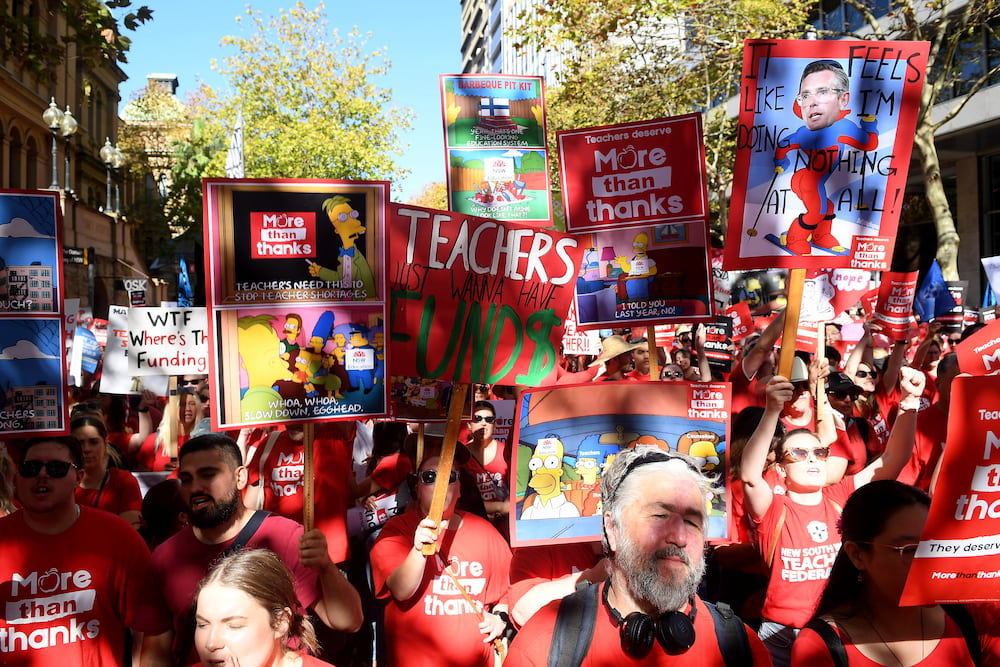More than 17,000 teachers and staff from 540 Catholic diocesan schools in the ACT and NSW will strike for 24 hours next week.
Independent Education Union of Australia NSW/ACT Branch Secretary Mark Northam says teachers will walk off the job on May 27.
“Taking protected industrial action is no small thing. We don’t take it lightly,” he said on Thursday.
“Teachers and support staff across both the government and non-government sectors are dedicated professionals pushed to breaking point.
“Schools have been running on good will, but it is rapidly evaporating.”
The industrial action follows a 24-hour strike on May 4 by thousands of NSW public school teachers concerned about a chronic teacher shortage.
They are demanding a pay increase above the 2.5 per cent cap on NSW public sector wage rises.
IEU members participated in a formal balloting process with all 11 Catholic dioceses endorsing the strike.
“The sharply rising cost of living, lack of real wages growth, ever-increasing workloads and the pandemic have caused crippling staff shortages in Catholic schools. Our members are exhausted and burnt out,” Mr Northam said.
Catholic school employers had followed the NSW government’s lead in limiting pay rises to 2.04 per cent – “a short-sighted approach that has resulted in the current staffing crisis”, he said.
“Teachers are leaving the profession and graduates are not entering it.”
The IEU wants a pay increase of 10 to 15 per cent over two years, pay parity with colleagues in public schools, less paperwork and more class preparation time.
A statement from Catholic Employment Relations said the decision to strike was regrettable given the disruption students, parents, and the school community had endured over the last two years.
“Catholic Education strongly supports teachers and general staff receiving a meaningful pay increase and improved benefits for the important job they do,” Ross Fox said on behalf of the diocesan employers.
“We’ve responded to all of the union’s claims and offered a range of significant benefits for staff, including a guarantee to at least match any pay increase provided to public school teachers,” he said.
Meanwhile, new data from the NSW Secondary Principals Council has revealed nearly one quarter of principals are set to retire over the next three years.
NSW Labor leader Chris Minns said the survey was sober reading.
“Unfortunately it is not a surprise that teachers and principals are looking to leave the profession while the government fails to fix ongoing staff shortages and workload issues,” he said.
The report highlights and confirms a number of issues teachers and students already know about, Labor’s education spokeswoman Prue Car said.
“Principals are under so much pressure … struggling every day to find enough teachers to fill their classrooms,” she said.
She accused the government of doing nothing to recruit more teachers to address a shortage around the state.
Premier Dominic Perrottet and Education Minister Sarah Mitchell have established advisory groups made up of the state’s top public school principals and some of its best teachers across public and private sectors.
Ms Car dismissed those advisory groups as “talkfests” and said the government should encourage high achieving students to pursue teaching, as well as pay teachers more to retain the workforce.
“In a state where it is very hard to make ends meet, it’s almost impossible for a teacher, a nurse or paramedic to pay their bills,” she said.
Mr Perrottet has suggested action on public sector wages will be a feature of next month’s budget but warned the various unions will not necessarily be satisfied.



